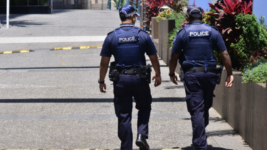Queensland Police Banned from Using Chokehold

Queensland Police Chief Katarina Carrol has announced that police officers in her state will no longer be using the move, and it will be removed from the training manual, saying that options have changed for officers to apply force in challenging and life-threatening situations.
In Queensland, officers had been permitted to apply the ‘chokehold’ – its official name is the lateral vascular neck restraint (LVNR) – in circumstances:
- Where an an incident is assessed as high risk and there is an immediate operational necessity to apply the restraint; or
- When acting or aiding in self-defence.
Chokehold, banned, immediately.
Officers had been trained to apply the hold during a violent struggle at the point of arrest.
However, the dangers of the LVNR have been well documented for many years. Pressuring someone’s neck so that they can not breathe properly and become physically weak is incredibly dangerous – even for those trained in the skill – too much pressure, pressure to the wrong area of the body or sustained pressure can be dangerous, even lethal.
The use of excessive force being used by police officers has also come sharply into focus, particularly since the pandemic, but also because the number of people dying during arrest or in custody has been steadily increasing.
The death of George Floyd
The killing of George Lloyd ,who was murdered by former police officer Derek Chauvin when the officer kneeled on his neck for nine minutes and 29 seconds while he pleaded 27 times for breath, certainly bought police tactics such as the ‘chokehold’ or ‘sleeper’ hold into the spotlight.
The public outrage led to the proposed Justice in Policing Act 2020, a federal law aimed at reforming US police departments.
Under the legislation, federal law enforcement officers would be banned from using chokeholds like the one that ended Floyd’s life, and it would require state and local police departments that receive federal funding to adopt the same policy.
As of 2023, this legislation has still not been enacted in the US, but many jurisdictions including California, Florida, New York state, Chicago, Denver, Houston, Minneapolis, Phoenix and Seattle have enacted their own regulations to ban the chokehold.
After George Floyd’s death France also quickly banned the chokehold.
Other Australian states
In Australia, civil liberties advocates and human rights groups have long been concerned about the use of the ‘chokehold’. While the nation’s two biggest police forces, New South Wales and Victoria, don’t formally advocate for officers to use chokeholds or respiratory restraints, there is evidence that officers are using these techniques.
The move by QPS is a positive one and largely the result of the fact that the use of the LVNR has been considered in four separate findings by Queensland coroners since 2011, highlighting the dangers of using such a move particularly in “dynamic situations” – there the person restrained is not compliant or still and it has welcomed by the community.
QPS opposes the ban
But Queensland Police Union is in vehement disagreement with the ban. It says it is a “knee jerk” reaction and it is calling for a review.
In a statement union president Ian Leavers has said that “The QPU believes in having as many use of force options as practical to keep officers safe and does not support reducing use of force options for police. The QPU has even suggested that “the only thing banning the LVNR for police will do is force police to become more reliant on batons, tasers and firearms.”
This is a fairly dangerous and alarmist statement. Currently, police are armed with guns, tasers and capsicum spray, and in some cases rubber pellets, which they use regularly – to the point where these appear to have become ‘normal’ tools of everyday policing.
Further, police are rarely alone – arrests and confrontations with members of the general public typically occur while police are accompanied by other trained officers – there is additional police assistance available immediately if an altercation occurs.
Police are adequately equipped without the ‘chokehold’
It appears, to the ordinary person, police officers are very well equipped for tackling even the most challenging of situations, and most of us would prefer to see police use less force – in all situations.
There is ongoing community debate that the increasing militarisation of Australian police forces has gone too far – and has moved police officers away from traditional community policing models and modalities.
We see time and again, instances where police place an over-reliance on the use of weapons and brute force, despite the fact that there is a growing body of research which supports the fact that increasing police weaponry does not make communities safer.
The offence of choking, strangulation or suffocation in New South Wales
In December 2018, the NSW Parliament passed the Crimes Legislation Amendment Bill which inserted a new section 37(1A) into the Crimes Act 1900.
Unlike the existing section 37, subsection (1A) does not require the prosecution to prove that the defendant’s actions were intended to render the complainant unconscious, insensible or incapable of resistance.
The new subsection has significantly broadened the situations where acts of choking can amounts to a discrete criminal offence.
Reasoning behind the new law
According to a Parliamentary Research Paper of September 2018:
“Non-lethal strangulation is a significant form of domestic violence offending designed to exert physical and psychological control over victims. Non-lethal strangulation may also act as indicator of future violence, including homicide.”
The authors of the paper noted that:
“[S]trangulation offences “were not being charged under the NSW offence of strangulation, but rather were being charged as common assault or assault occasioning actual bodily harm offences”.
They further noted that 600 people were charged under section 37 between 2014 and 2018, and less than half of those prosecutions resulted in convictions.
The authors expressed the view that:
- The requirement to prove the defendant’s state of mind is a significant impediment to successfully prosecuting the offence of choking,
- The two year maximum prison sentence applicable to the offence of common assault does not adequately reflect the seriousness of the act of choking, nor does it send a sufficiently strong message to the community that the conduct is socially unacceptable, nor act as a strong enough deterrent to would-be offenders,
- The offence of assault occasioning actual bodily harm – which attracts a five year maximum penalty – is not always applicable to the act of choking because it generally requires the infliction of physical injuries that are “more than transient or trifling”, which are not always occasioned during acts of choking, suffocation or strangulation, and
- The seriousness and prevalence of domestic violence offences in NSW, as well as the fact choking is a common feature of such offences, demands a discrete offence that is not difficult to establish.
The offence of choking, suffocation and strangulation in NSW
As a result of various inquiries and papers, section 37(1A) of the Crimes Act 1900 (NSW) (‘the Act’) was inserted into the Crimes Act 1900.
The offence prescribes a maximum prison term of five years for any person who “intentionally chokes, suffocates or strangles another person without the other person’s consent”.
The Act does not define the terms choke, suffocate or strangle, so the ordinary meaning of those words apply.
‘Choke’ has been defined as “severe difficulty in breathing because of a constricted or obstructed throat or a lack of air”.
‘Suffocate’ means to “have or cause to have difficulty in breathing”.
And ‘strangle’ means to “squeeze or constrict the neck”.
Other acts of choking
Under section 37(1) of the Act, the maximum penalty increases to 10 years in prison where a person:
- Intentionally chokes, suffocates or strangles another so as to render them unconscious, insensible or incapable of resistance, and
- Is reckless as to rendering the other person unconscious, insensible or incapable of resistance.
And section 37(2) prescribes a maximum penalty of 25 years in prison for any person who:
- chokes, suffocates or strangles another so as to render them unconscious, insensible or incapable of resistance, and
- does so with the intention of enabling himself or herself to commit, or assisting any other person to commit, another indictable offence.
An ‘indictable offence’ is one that can be finalised in a higher court, such as the District or Supreme Court.
It includes a broad range of offences such as detain for advantage (kidnapping), larceny (stealing) and a most sexual offences.
Defences to choking, suffocation and strangulation
A range of defences are available for offences under section 37 of the Crimes Act, including:
- Self-defence,
- Duress, and
Where evidence of any such defence is raised, the onus then shifts to the prosecution to prove beyond reasonable doubt that it does not apply.
If the prosecution is unable to ‘negative’ the defence, the defendant is entitled to an acquittal.
Going to Court for a Choking Offence?
If you are going to court for choking, suffocation or strangulation, call Sydney Criminal Lawyers anytime on (02) 9261 8881 to arrange a free first conference with an experienced criminal defence lawyer who will advise you in relation to the your specific situation – including the strengths and/or weaknesses of the prosecution case and any defences that may be available to you – and fight to achieve the optimal outcome, whether that involves pushing for the withdrawal / downgrading of charges or persuading the magistrate or judge to dismiss the case in court.








